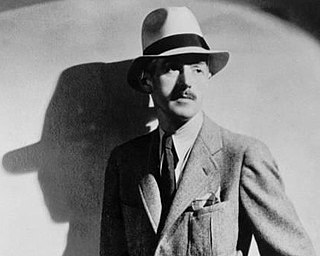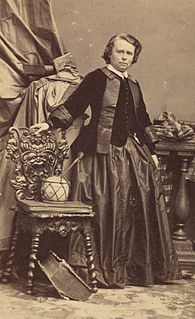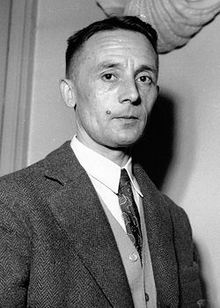A Quote by Gustave Flaubert
In the dark room a cloud of yellow dust flew from beneath the tool like a scatter of sparks from under the hooves of a galloping horse. The twin wheels turned and hummed. Binet was smiling, his chin down, his nostrils distended. He seemed lost in the kind of happiness which, as a rule, accompanies only those mediocre occupations that tickle the intelligence with easy difficulties, and satisfy it with a sense of achievement beyond which there is nothing left for dreams to feed on.
Related Quotes
Samuel Spade's jaw was long and bony, his chin a jutting v under the more flexible v of
his mouth. His nostrils curved back to make another, smaller, v. His yellow-grey eyes were
horizontal. The V motif was picked up again by thickish brows rising outward from twin creases
above a hooked nose, and his pale brown hair grew down--from high flat temples--in a point on
his forehead. He looked rather pleasantly like a blond Satan.
There must be only three supreme values which govern a person's life: Reason, Purpose, and Self-esteem. Reason, as his only tool of knowledge--Purpose, as his choice of the happiness which that tool must proceed to achieve--Self-esteem, as his inviolate certainty that his mind is competent to think and his person is worthy of happiness, which means: is worthy of living. These three values imply and require all of man's virtues, and all his virtues pertain to the relation of existence and consciousness: rationality, independence, integrity, honesty, justice, productiveness, pride.
At night I would lie in bed and watch the show, how bees squeezed through the cracks of my bedroom wall and flew circles around the room, making that propeller sound, a high-pitched zzzzzz that hummed along my skin. I watched their wings shining like bits of chrome in the dark and felt the longing build in my chest. The way those bees flew, not even looking for a flower, just flying for the feel of the wind, split my heart down its seam.
To his eyes all seemed beautiful, but to me a tinge of melancholy lay upon the countryside, which bore so clearly the mark of the waning year, Yellow leaves carpeted the lanes and fluttered down upon us as we passed, The rattle of our wheels died away as we drove through drifts of rotting vegetation--sad gifts, as it seemed to me, for Nature to throw before the carriage of the returning heir of the Baskervilles.
His face set in grim determination, Richard slogged ahead, his fingers reaching up to touch the tooth under his shirt. Loneliness, deeper than he had never known, sagged his shoulders. All his friends were lost to him. He knew now that his life was not his own. It belonged to his duty, to his task. He was the Seeker. Nothing more. Nothing less. Not his own man, but a pawn to be used by others. A tool, same as his sword, to help others, that they might have the life he had only glimpsed for a twinkling. He was no different from the dark things in the boundary. A bringer of death.
A moment, and its glory was no more. The sun went down beneath the long dark lines of hill and cloud which piled up in the west an airy city, wall heaped on wall, and battlement on battlement; the light was all withdrawn; the shining church turned cold and dark; the stream forgot to smile; the birds were silent; and the gloom of winter dwelt on everything.
Change begets change. Nothing propagates so fast. If a man habituated to a narrow circle of cares and pleasures, out of which he seldom travels, step beyond it, though for never so brief a space, his departure from the monotonous scene on which he has been an actor of importance would seem to be the signal for instant confusion. The mine which Time has slowly dug beneath familiar objects is sprung in an instant; and what was rock before, becomes but sand and dust.
Man is more than his environment. It is from the innate quality of the Spirit in him, his inner storehouse, that he draws those ideas, his intuitions, which unify his perceptions of the external world instantaneously with a value which is qualitative and not quantitative, and which he embodies in the works of his culture - those achievements which belong not only to one particular time but to all times, and mark the path of his upward progress.
Blood had long since ceased to beat from one end to the other, but one could sense, from passages marked with fresher traces of wheels and hooves, that once the meaning and even the very idea of a long journey was lost, sleep had not descended over it in one fell swoop: it had continued to steal a march here and there, in a discontinuous way, and over short distances, like a laborer who feels his cart jolt on a section of Roman road that crosses his field.
Frank W. Woolworth once told me that the turning-point in his career did not come until he was thrown flat on his back by illness. He was sure that his business would go to pieces during his long, enforced absence. Instead, he discovered that he had in his employ men who could overcome difficulties when given power to exercise initiative. After that Woolworth left many problems and difficulties to be solved by subordinates and turned his attention to big things.
The more closely the author thinks of why he wrote, the more he comes to regard his imagination as a kind of self-generating cement which glued his facts together, and his emotions as a kind of dark and obscure designer of those facts. Reluctantly, he comes to the conclusion that to account for his book is to account for his life.





































